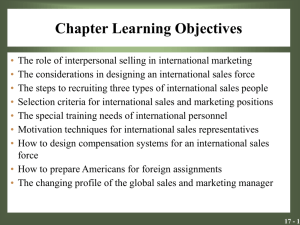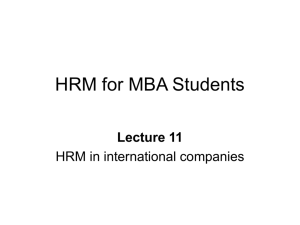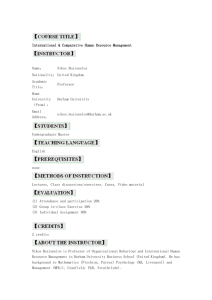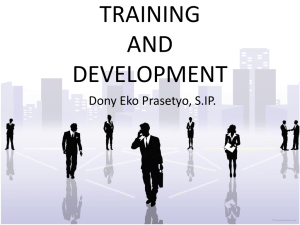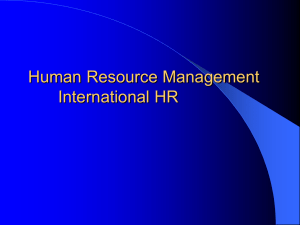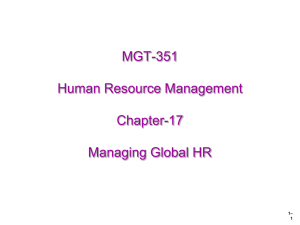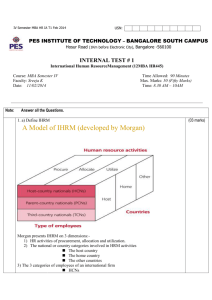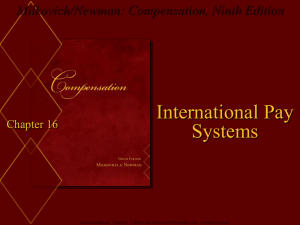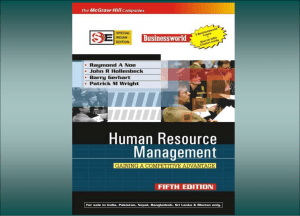Document 13135787
advertisement
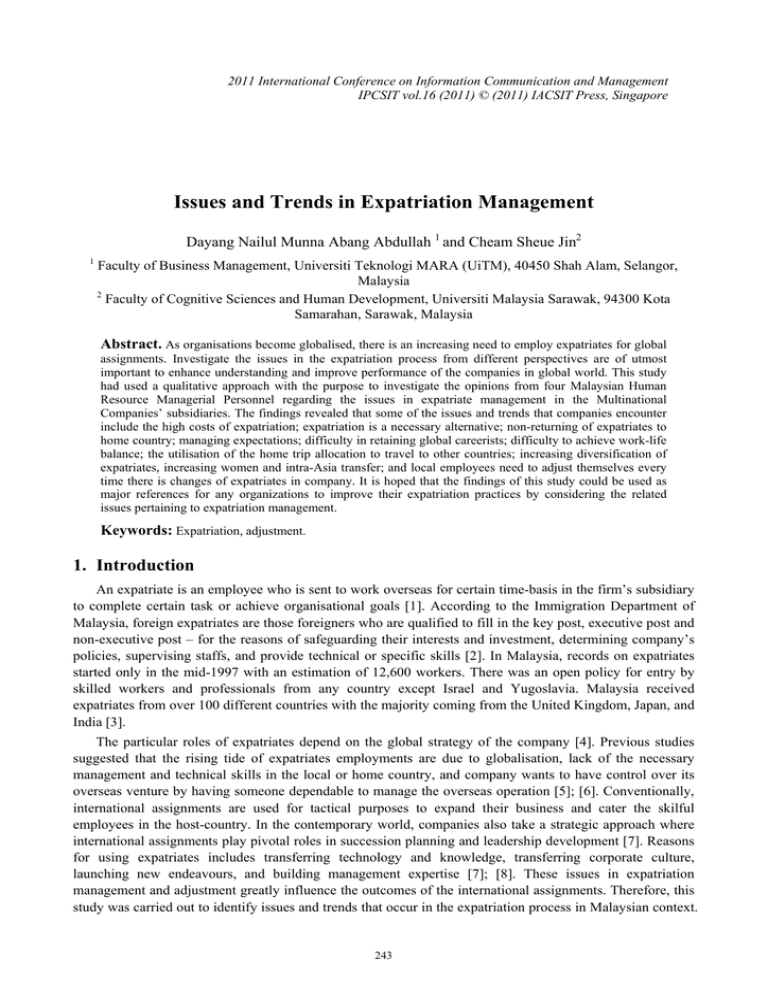
2011 International Conference on Information Communication and Management IPCSIT vol.16 (2011) © (2011) IACSIT Press, Singapore Issues and Trends in Expatriation Management Dayang Nailul Munna Abang Abdullah 1 and Cheam Sheue Jin2 1 Faculty of Business Management, Universiti Teknologi MARA (UiTM), 40450 Shah Alam, Selangor, Malaysia 2 Faculty of Cognitive Sciences and Human Development, Universiti Malaysia Sarawak, 94300 Kota Samarahan, Sarawak, Malaysia Abstract. As organisations become globalised, there is an increasing need to employ expatriates for global assignments. Investigate the issues in the expatriation process from different perspectives are of utmost important to enhance understanding and improve performance of the companies in global world. This study had used a qualitative approach with the purpose to investigate the opinions from four Malaysian Human Resource Managerial Personnel regarding the issues in expatriate management in the Multinational Companies’ subsidiaries. The findings revealed that some of the issues and trends that companies encounter include the high costs of expatriation; expatriation is a necessary alternative; non-returning of expatriates to home country; managing expectations; difficulty in retaining global careerists; difficulty to achieve work-life balance; the utilisation of the home trip allocation to travel to other countries; increasing diversification of expatriates, increasing women and intra-Asia transfer; and local employees need to adjust themselves every time there is changes of expatriates in company. It is hoped that the findings of this study could be used as major references for any organizations to improve their expatriation practices by considering the related issues pertaining to expatriation management. Keywords: Expatriation, adjustment. 1. Introduction An expatriate is an employee who is sent to work overseas for certain time-basis in the firm’s subsidiary to complete certain task or achieve organisational goals [1]. According to the Immigration Department of Malaysia, foreign expatriates are those foreigners who are qualified to fill in the key post, executive post and non-executive post – for the reasons of safeguarding their interests and investment, determining company’s policies, supervising staffs, and provide technical or specific skills [2]. In Malaysia, records on expatriates started only in the mid-1997 with an estimation of 12,600 workers. There was an open policy for entry by skilled workers and professionals from any country except Israel and Yugoslavia. Malaysia received expatriates from over 100 different countries with the majority coming from the United Kingdom, Japan, and India [3]. The particular roles of expatriates depend on the global strategy of the company [4]. Previous studies suggested that the rising tide of expatriates employments are due to globalisation, lack of the necessary management and technical skills in the local or home country, and company wants to have control over its overseas venture by having someone dependable to manage the overseas operation [5]; [6]. Conventionally, international assignments are used for tactical purposes to expand their business and cater the skilful employees in the host-country. In the contemporary world, companies also take a strategic approach where international assignments play pivotal roles in succession planning and leadership development [7]. Reasons for using expatriates includes transferring technology and knowledge, transferring corporate culture, launching new endeavours, and building management expertise [7]; [8]. These issues in expatriation management and adjustment greatly influence the outcomes of the international assignments. Therefore, this study was carried out to identify issues and trends that occur in the expatriation process in Malaysian context. 243 2. Research Methodology Qualitative research approach had been utilised in this study. Issues and trends regarding the expatriate management were explored using in-depth interview. During the interview, informants were asked with several questions that are semi-structured, open-ended, or according to ad-hoc response. It is to enable the informants to talk about their experience, feelings, and opinions of a subject. Different interview techniques such as probing questions, responding to the informants, showing interest, reconfirming the response, taking notes, follow up and remind the informants to stay in line with the topic when deviation occurs, and keep the informants to talk and express their view were used during the interview. Then the interview data were documented and decoded. Data collected was kept as confidential and private, only used by researcher and related supervisor for academic purposes. The informants of this research were drawn from human resource managers or human resource representatives of corporations. Four companies, which are locating in Kuala Lumpur and Kuching, had been selected due to the accessibility of the researcher and because Kuala Lumpur is one of the most developed areas in Malaysia, therefore it is easier to identify the suitable companies for study. In this study, the purposive sampling method was used to identify the informants, thus the sample sizes may not be predetermined prior to data collection, and it depends on the resources and time available, as well as the study’s objectives [9]. As a result, there were four informants involved in this study. To enhance the reliability of the data, sound recorder was utilised to record the interview session whenever it is permitted by the informants. Notes were taken in the keyword form to ensure the important content of interview was jotted down for recollection and data analysis. After the interview, sound recording was played and replayed to transcribe the interview session, where the exact reproduction of the interview, with every words and sounds and silences were coded. Descriptive narratives of the notes were composed and questions to be followed up were identified [9]. Then, the content of each interview was summarised, and passed back to the selected contact person in each company to check for factual errors. Subsequently, the constant comparative or grounded theory method was used to analyse the data by reading the transcription and identifying the key points, comparing the contents of some interviews in order to determine the trend and enhance understanding on the content. Codes were compared to find consistencies and differences [10]. Consistencies of codes revealed categories, therefore demanded categorising the specific events, in due course, category saturated when no new codes related to it were formed [10]. Any discrepancies between the interview data had been noted. The Microsoft Office OneNote 2007 or Microsoft Word was used to save and organise the appointment and interview data. Then the contents were reformulated with words that are more theoretical and compared to the literature reviews. Differences, trends, and coherence in the content were analysed to produce the full report of interview content. 3. Findings and Discussion In this study, four informants were obtained from two different states in Malaysia, two are from Kuala Lumpur, and two are from Kuching. To protect the privacy of informants, in this study they are known as Informant 1 from Company 1, Informant 2 from Company 2, Informant 3 from Company 3, and Informant 4 from Company 4. They are all Malaysians who are currently holding managerial positions in the multinational companies’ Human Resource Departments. Table 1 is the summary of their demographic backgrounds and interview details. The empirical data had been gathered through the interview sessions with the four informants. Their opinions and experience in the expatriate management in their organisations were discussed. Costs are the main concern in expatriate management. The costs involved in the expatriation are three to four times higher than the domestic human resource management [11]. Due to the recent economic recession, most companies have scaled down the expatriation in order to save costs. However, all informants mentioned that expatriate assignment is necessary for the companies. This is because they need the expatriate to transfer their expertise to the host countries to help them achieve the business goals and the parent company needs someone trusted to manage the subsidiaries and new business set up in the host countries. 244 Table 1: Informants’ Demographic Details Gender Informant 1 Male Informant 2 Male Informant 3 Male Informant 4 Female Nationality Malaysian Malaysian Malaysian Malaysian Race Chinese Chinese Malay Chinese Age range 51 and above 31-40 51 and above 41-50 Education level Master Master Bachelor Master Profession Asia HR Director Rewards Manager Senior HR Manager – PCB Asia Assistant HR Manager Years of involvement in expatriation management Date of interview 6-10 1-5 21 and above Indirect involvement 3rd December 2008 16th February 2009 25th February 2009 Time of interview Location of interview 2:00 – 3:15 p.m. Phone interview 17th December 2008 2:00 – 3:00 p.m. Company 2 1:30 – 3:00 p.m. Company 3 2:00 – 2: 45 p.m. Company 4 In most cases, expatriate assignments are supported by the senior management team, and sometimes the alternative types of assignments are deemed as more costly and are too short term, which are not suitable for long-term assignment needs. Occasionally, the utilisation of alternative types of assignment depends on the nature of the assignments and job position. Virtual work arrangement is not applicable in manufacturing company because they need to turn out to work physically, especially on the production site. Most of the time expatriation is the most important alternative, especially when no local could do the job. Expatriates are there to train the locals in order for them to take over their positions, and succeed them. This is contrasted with Brewster and Scullion (1997) and Sparrow, Brewster, and Harris, (2004) that most of the companies employ the use of alternative forms of international assignments in order to decrease the expensive costs dealing with expatriation [6]; [12]. In accordance with one of the informants, expatriate tends not to return to the home country after they have been expatriated for more than few years. Some of the reasons are they worry for the re-adjustment to the home country, such as schooling system for their children after homecoming, the cutback of their benefits and compensation package, and they also face the ambiguity in their career path. Supports provided by the home company are limited; most of the time repatriates are required to manage their own readjustment process. Nevertheless, informant mentioned that they do not view the non-returning of expatriate as a bad thing, but is a good career development programme for the assignees. In addition, under the new psychological contract, both employees and employers have lower expectations for lasting employment furthermore employees are liable for their own career progress [12]. Managing expectation is another issue that concern expatriation. Most of the assignees and family members have not been assigned overseas before so they do not know what to expect, they facing the uncertainty of the career path, and what would come to them after repatriation. Informant pointed out that, there should be a process and upfront communication on the expectations of the assignment to let the assignees know the reasons they are there, the risk they would face, the things they would learn as well as there is no guarantee they will be successful in the assignment and there is no guarantee for job or promotion when the individual return home. Being able to articulate clearly the objectives and expectations for the expatriate is imperative in terms of reducing vagueness surrounding the expatriate assignment, and making sure that the targets of the expatriate and the targets of the organizations are associated [13]. They need to make sure the expatriates are assimilating to the local environment and be productive at the same time. Long period of learning and adjusting might reduce their work productiveness and it is very costly to keep them there. Besides, informant suggested that for the selection of expatriate, it is better if the candidate has the mentality of global careerist, because they have to take up the unstable and unsettling lifestyle. However, another informant mentioned 245 that global careerists are those who like to work globally. It is hard to retain them when they decide to work overseas instead of staying in the same company after repatriation. The emergence of a borderless career concept makes the exit of repatriate no longer a negative career move. This is because the international assignment has been viewed as a stepping-stone for them to advance their career although not within their current company [12]. Informant have opinionated that work-life balance would never be achieved for expatriate, though HR are promoting the concept, as informant said, “especially when they are coming in, they need to really get their things done within the shortest period of time, so their career focus is really on work, not so much on work-life balance.” Thus, most of the companies would compensate them with the hardship allowance and club membership. The emergent trend in the company is instead of using the money for home trip to go back home, expatriates who like to travel will use the money to take a trip to other countries. Another trend that arises from the findings is international assignees have becoming more diverse, majority of expatriates no longer from the United States or the United Kingdom, intra-Asia assignments are becoming more prominent [14]. China, Japan, Hong Kong, Taiwan, Singapore, and India are the main locations of the expatriates from and to. As mentioned by one of the informants, Singapore and India are the two main countries that have the professional skills or expertise that the companies required. In addition, most companies have shown no discrimination toward female expatriates, and increasingly employing them. However, female managers in Japanese company are always lesser than the male. This situation can be related to their Japanese culture that inclines towards masculinity [15]. In addition, a trend in the company that has expatriates holding key positions is that local employees need to adjust themselves every time there are expatriates in and expatriates out since locals are the one who stay longer than the expatriates do. They have to face the new management team with different management styles from the previous management team, and it is deemed as hard and frustrating for them to cope. Fig. 1: Summary of Issues and Trends in Expatriation Management 4. Conclusion It is believed that the findings have successfully fulfilled the objective of the study that is to contribute to the understanding of expatriate management in Malaysian context by providing comprehensive information and issues related to expatriation. This study provides the organisation with the yardstick to benchmark with other organisations with regards to the issues in expatriation management as well as promotes the information exchange between organisations to improve their practices. It is noticed that research in the field of expatriate management in Malaysia is still limited. This study is merely based on the opinions from Malaysian informants who work in foreign subsidiaries. Therefore, it is recommended that opinions from Malaysian-owned companies could be investigated to discover any differences in the expatriate management practices and issues for future research. 246 5. Acknowledgements The authors wish to thank Universiti Teknologi MARA (UiTM), Shah Alam for the funding, and to the informants of this study for providing the information and allowing the dissemination of the findings of this study. Any flaws are the responsibility of the authors. 6. References [1] R. Takuechi, J.P. Shay, and J.T. Li. When does decision autonomy increase expatriate managers’ adjustment? An empirical test. Academy of Management Journal. 2008, 51(1): 45-60. [2] Immigration Department of Malaysia. Guidelines, Process and Procedure for Application of Expatriate, 2008. Available at http://www.registercompany.com.my/userfiles/file/Employment%20Pass%20%20Immigration%20Guidelines.pdf [3] A. Yong. Foreign labour employment policy and change in Australia, Singapore and Malaysia. Journal of Business Systems, Governance and Ethics. 2006, 1(1): 25-35. [4] J. Bonache, and J. Cervino. Global integration without expatriates. Human Resource Management Journal. 2006, 7(3): 89-100. [5] J.E. Beck. Understanding the Limits of Expatriate Adjustment. Singapore: Nanyang Technological University, 1997. [6] C. Brewster, and H. Scullion. (1997). A review and agenda for expatriate HRM. Human Resource Management Journal. 1997, 7(3): 32-41. [7] J.S. Black, H.B. Gregerson, M.E. Mendenhall, and L.K. Stroh. Globalizing People through International Assignments. USA: Addison-Wesley Longman, 1999. [8] Y.M. McNulty, and P. Tharenou. Expatriate return on investment: a definition and antecedents. International Studies of Management and Organisation, 2004, 34(3): 68–95. [9] N. Mack, C. Woodsong, K.M. Macqueen, G. Guest, and E. Namey. Qualitative Research Methods: A data Collector’s Field Guide. USA: Family Health International, 2005. [10] D. Ratcliff. 15 Methods of Data Analysis http://qualitativeresearch.ratcliffs.net/15methods.pdf in Qualitative Research, 2004. Available at [11] P. Dowling. International and Domestic Personnel/ Human Resource Management: Similarities and Differences. In: P. Enderwick, and J.H. Dunning (eds.). United Nations Library on Transnational Corporations: Transnational Corporations and Human Resources. 1994, 16, pp. 56-65. [12] P. Sparrow, C. Brewster, and H. Harris. Globalizing Human Resource Management. USA: Routledge, 2004. [13] P.M. Caligiuri, and S. Colakoglu. A strategic contingency approach to expatriate assignment management. Human Resource Management Journal. 2007, 17(4): 393-410. [14] Expatica An Asian Perspective on Short-term International Assignments, 2005. http://www.expatica.com/hr/story/an-asian-perspective-on-short-term-international-assignments 23409.html?ppager=0 Available at [15] H. Tran, and A. Wong. (2006). Expatriate Management: How Can the Expatriation Process Be Improved. Jonkoping International Business School, 2006. 247
